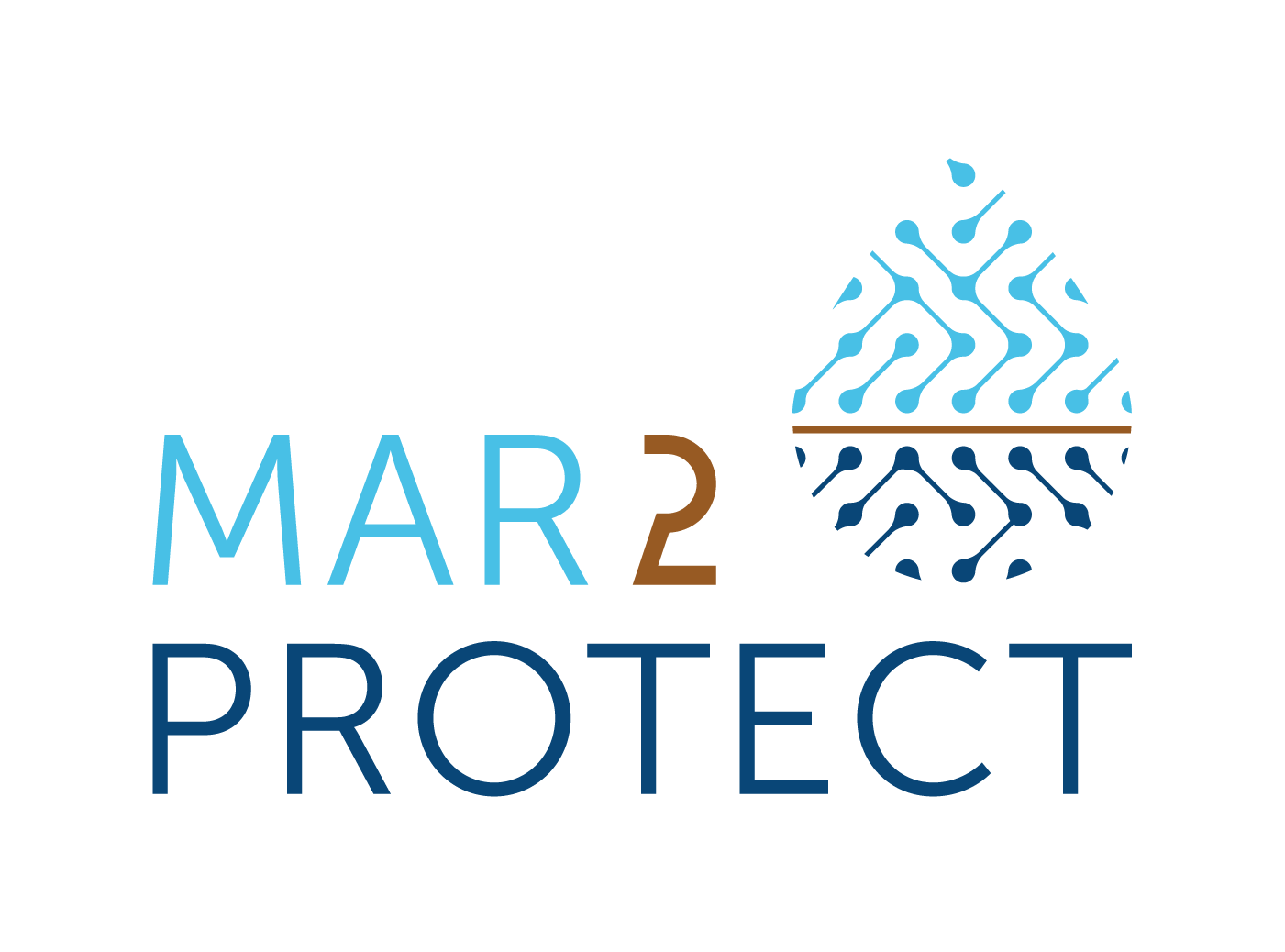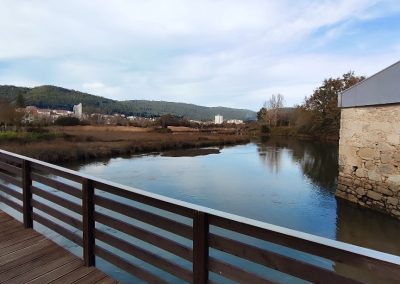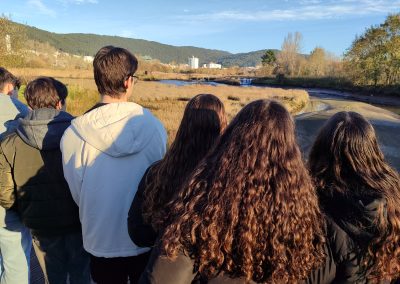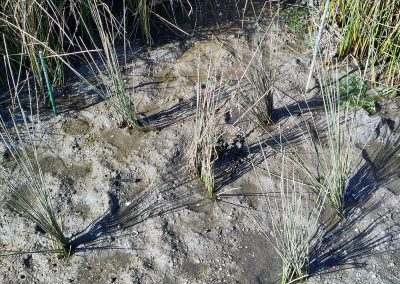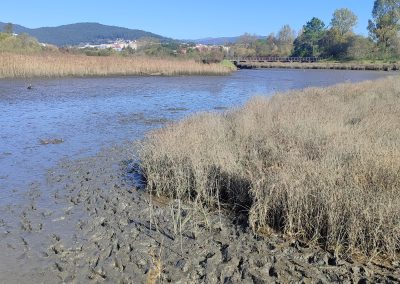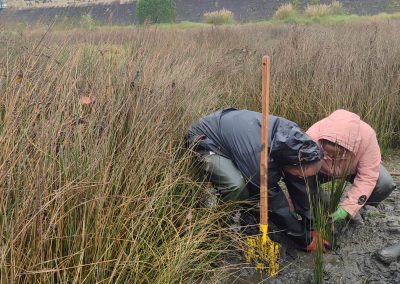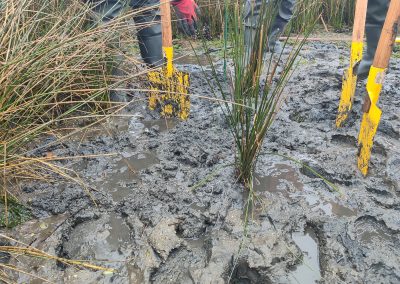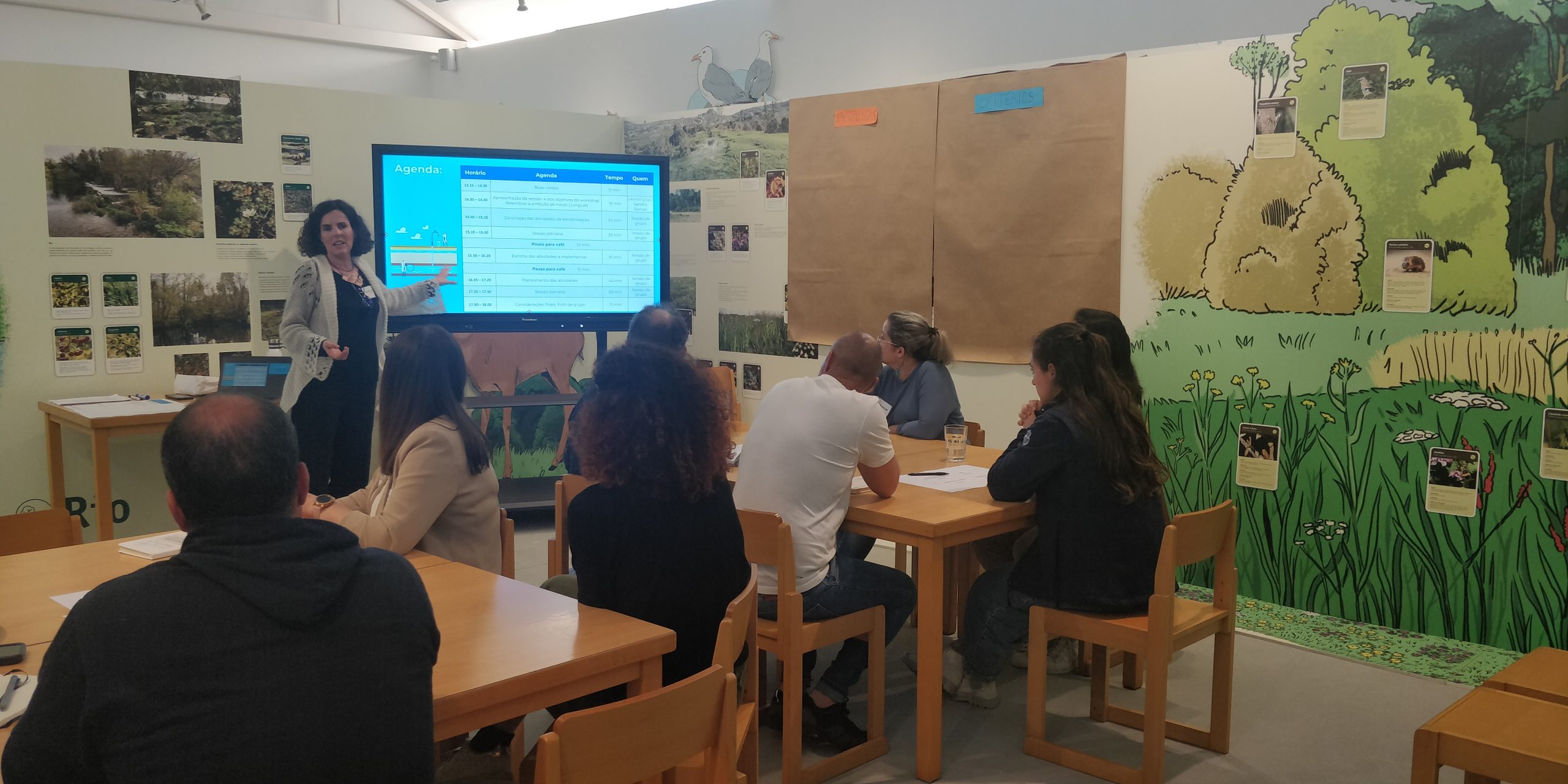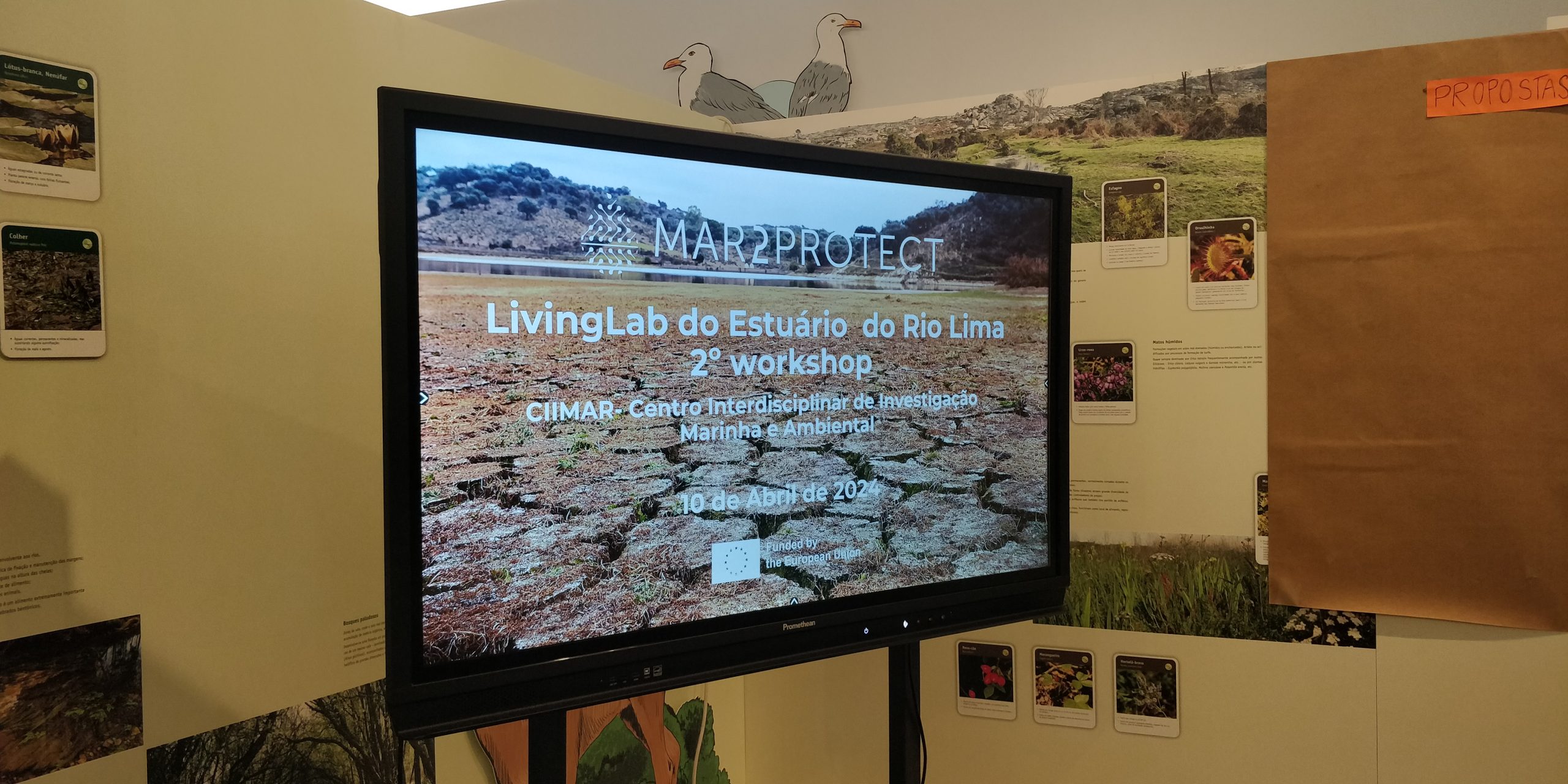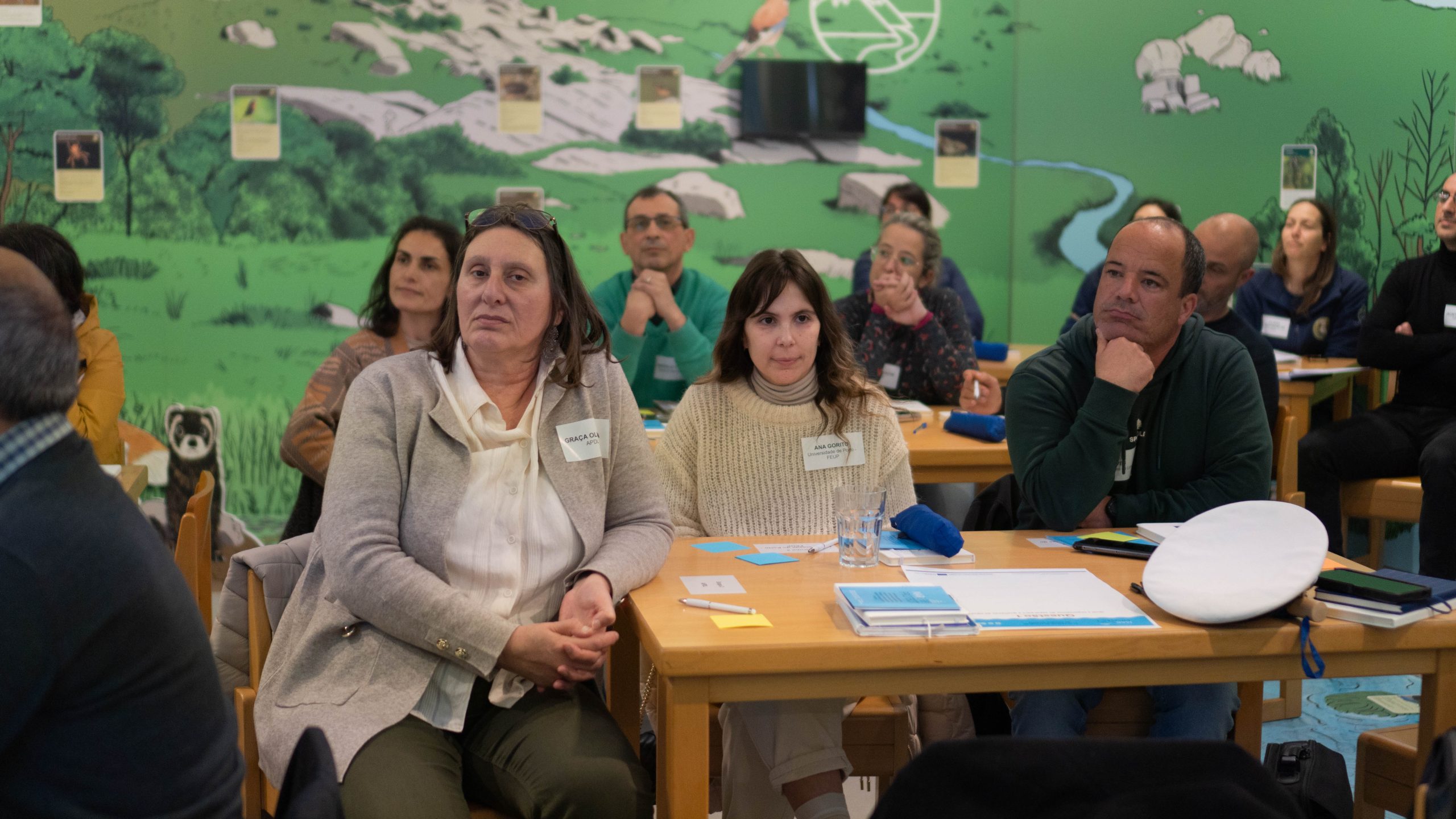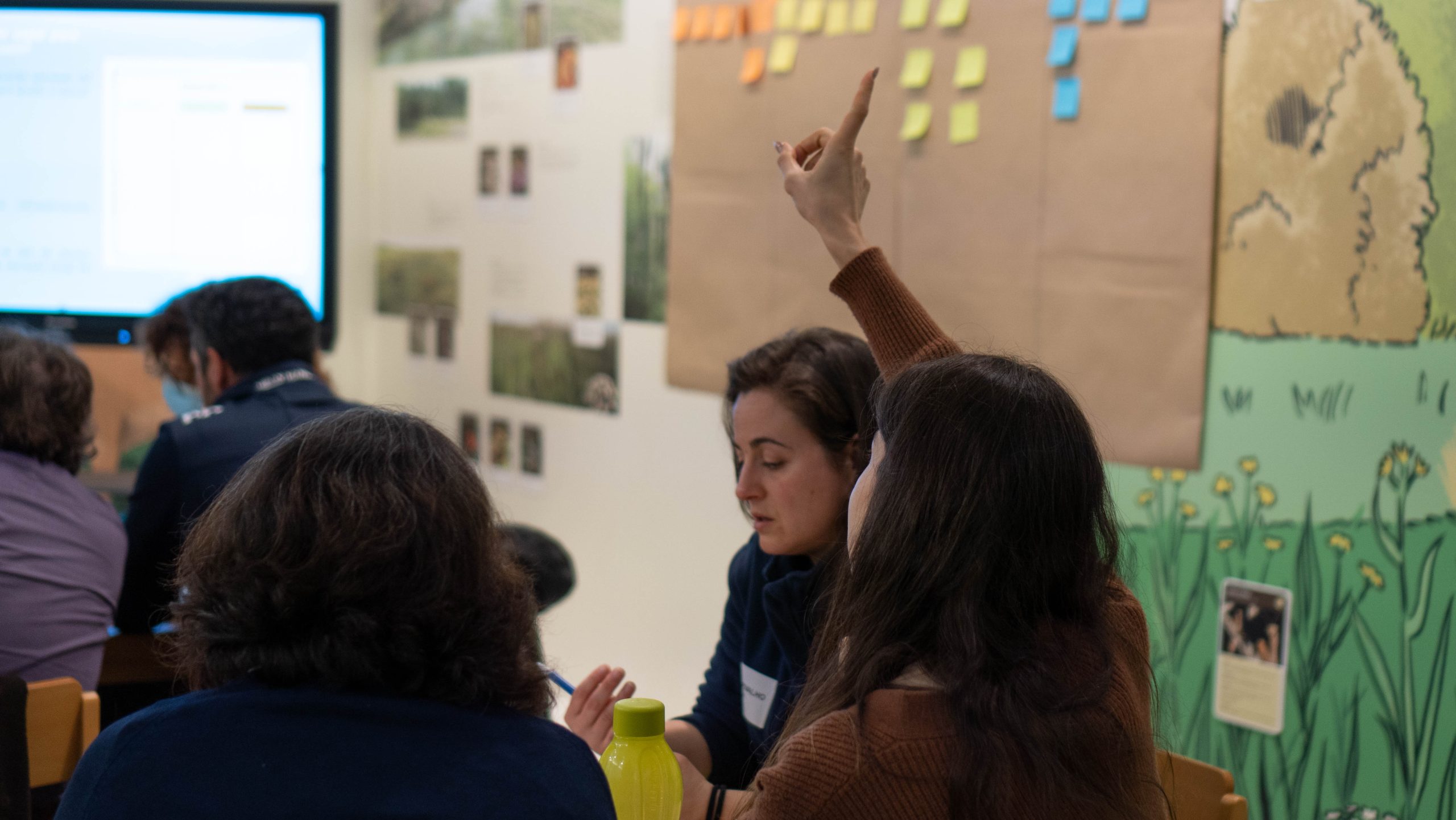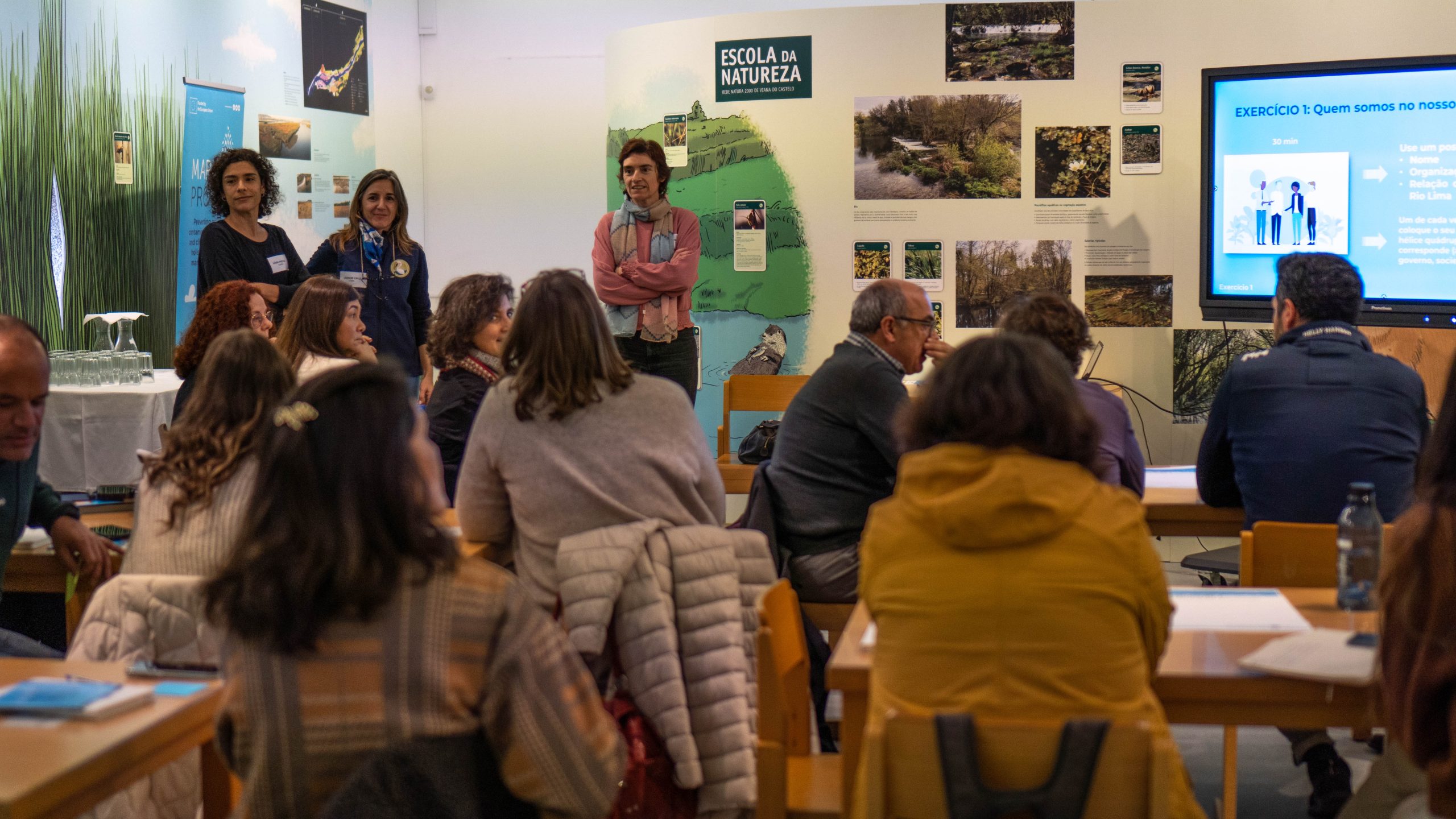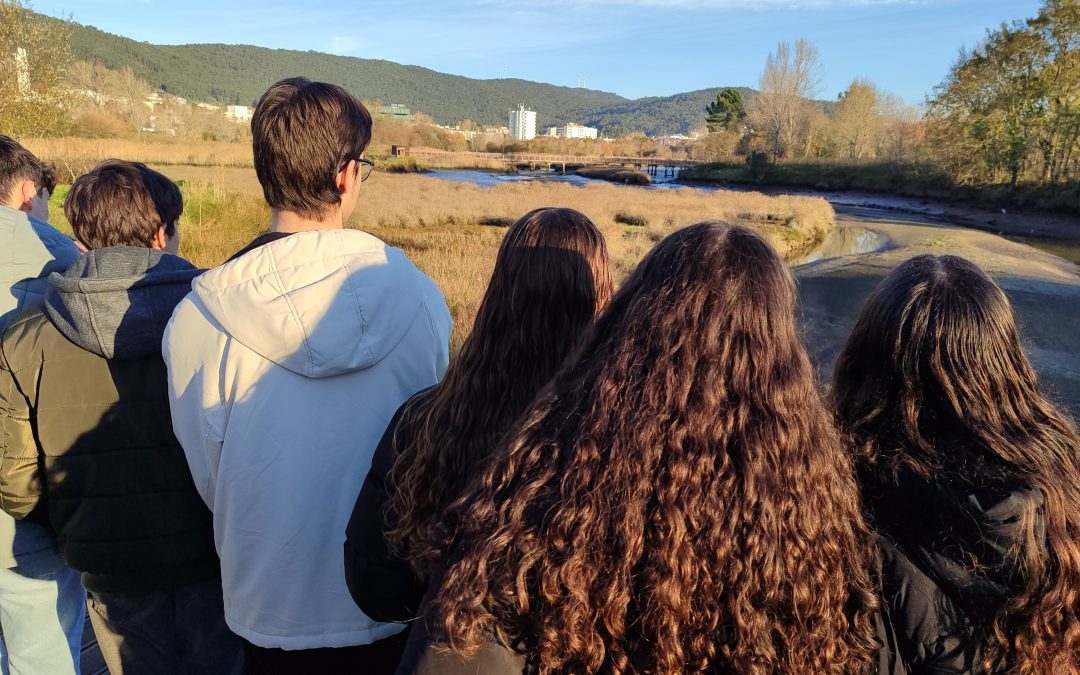
by admin | Feb 3, 2025 | Demosite 7, News
On 16 December 2024, MAR2PROTECT launched its first civil society engagement activity proposed by the Living Lab of the Lima river estuary demosite of the project. This event was organized by CIIMAR in collaboration with CMIA Viana do Castelo and the Santa Maria Maior Secondary School.
As part of the activity Saltmarsh as a laboratory, the 11th-grade class from Santa Maria Maior Secondary School participated in a field trip to the Lima estuary, located near the Urban Ecological Park. The objective of this excursion was to gain firsthand insight into the saltmarsh ecosystem and to understand the significant functions that these critical habitats serve, particularly in addressing water pollution and climate change challenges.
During the visit, students had a look at the site where the pilot revegetation study is being conducted as part of the Mar2Protect project. They also collected water samples to analyze some water physicochemical parameters at both low and high tide, allowing them to observe the natural variations within this highly dynamic environment.
With the support of CMIA, the students conducted a hands-on activity using a lab-scale model of a constructed wetland. This practical experience provided them with an opportunity to explore key concepts such as phytoremediation, as well as the use of natural and constructed wetlands as effective nature-based solutions.
Take a look at the photos taken!
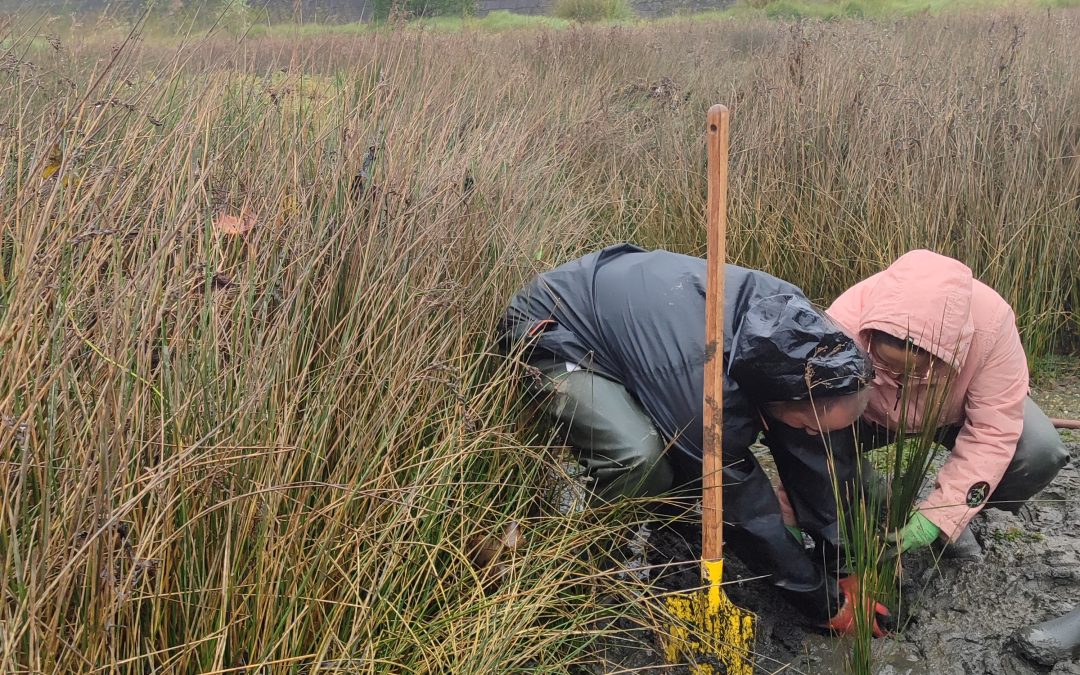
by admin | Nov 29, 2024 | Demosite 7, News
The pilot revegetation study at the Lima Estuary began on October 21st and 22nd, 2024. Led by the CIIMAR team, this project is designed to address significant environmental challenges by using the natural capabilities of saltmarsh plants for phytoremediation—the process of employing plants to remove contaminants from the environment. The study aims to improve surface water quality and reinforce the coastal protection functions inherent to saltmarsh ecosystems
The pilot project involves the careful transplantation of healthy Juncus maritimus plants collected from a donor site within the estuary to two distinct target areas:
- A control site, where Juncus meadows are already well-established.
- A site where saltmarsh vegetation has been significantly depleted.
Over the coming months, the CIIMAR team will closely monitor the development of these plants, assessing their growth and the potential impact on the removal of contaminants from the sediments, water, and plants themselves. This research will provide valuable insights into the role of revegetation in restoring ecosystem health and improving water quality in coastal environments.
Take a look at the photos and follow along as the pilot revegetation study progresses. We look forward to sharing further updates on the study’s advancement.

by admin | Apr 30, 2024 | Demosite 7, events, News
MAR2PROTECT, in collaboration with Centro Interdisciplinar De Investigacao Marinha e Ambiental (CIIMAR) and CMIA de Viana do Castelo, is thrilled to announce the successful launch of the second meeting of its LivingLab initiative at the Lima River estuary. The event took place on April 16, 2024, in Viana do Castelo, Portugal.
The workshop witnessed the enthusiastic participation of stakeholders from diverse sectors, including the public sector, academia, industry, and civil society. Employing a co-creative methodology, attendees engaged in fruitful discussions, identifying optimal strategies for local societal involvement, highlighting potential challenges within the case study, and fostering community awareness to prevent water contamination. Their invaluable feedback not only underscored the effectiveness of ongoing efforts but also illuminated the path forward for the LivingLab.
This LivingLab represents the inaugural venture of its kind in Portugal, marking a significant milestone in MAR2PROTECT’s broader mission. As part of a larger network spanning seven demo-sites across Africa and Europe, including South Africa, Tunisia, Netherlands, Italy, Spain, and now two locations in Portugal, this LivingLab embodies meticulous site selection based on past successes, climatic conditions, water sources, pollution types, Managed Aquifer Recharge schemes, and socio-political context.
The implementation of this LivingLab (and all other MAR2PROTECT LivingLabs) is supported by the methodology and detailed guidance provided by our partners from IHE Delft Institute for Water Education.
MAR2PROTECT seeks to save the world’s groundwater from contamination through an innovative and holistic approach. This research project brings together two main strategies, the M-AI-R tool and LivingLabs, to create new approaches for safeguarding groundwater as it becomes more vulnerable in the face of climate change.
The project kicked off in December 2022 and will run for four years. It is funded by the Horizon Europe programme with a total cost of €4.143.681,25. MAR2PROTECT will usher in a new generation of Managed Aquifer Recharge (MAR) that engages stakeholders and enhances both groundwater quality and quantity.
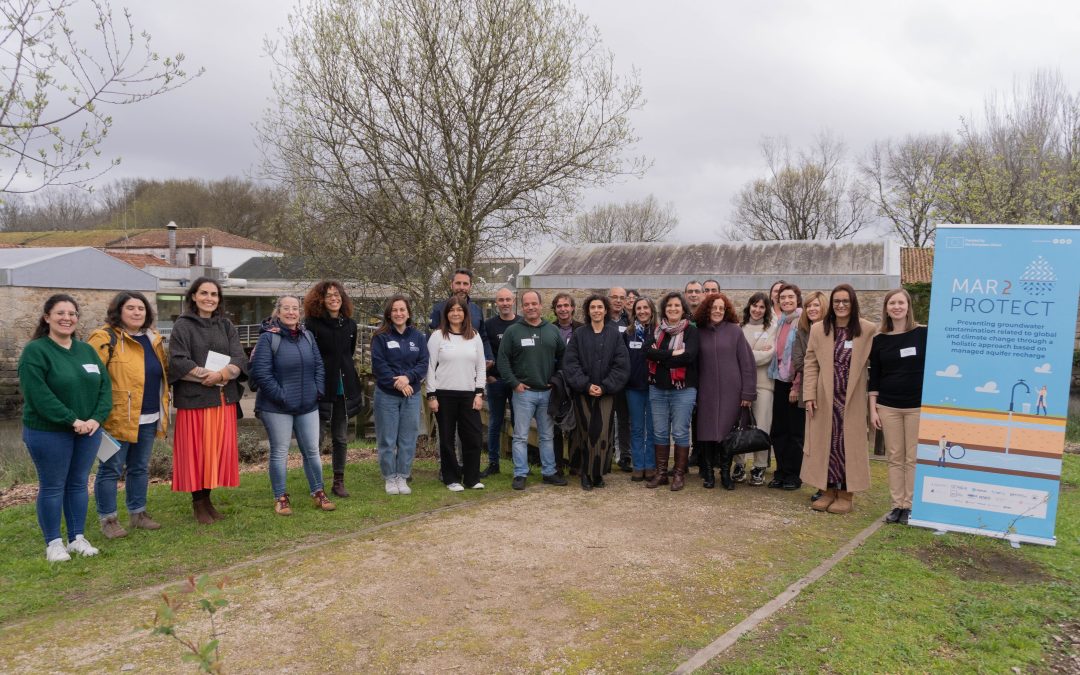
by admin | Feb 26, 2024 | Demosite 7, events, News
MAR2PROTECT, through its partner Centro Interdisciplinar De Investigacao Marinha e Ambiental (CIIMAR), and with the collaboration of CMIA de Viana do Castelo as a facilitator, held a successful workshop on February 21 to launch the project’s LivingLab in Viana do Castelo, Portugal, where the Lima River estuary is located.
Members of different sectors such as the public sector, academia, industry, and civil society attended the day. Using a co-creative approach, the stakeholders helped to identify the best ways for local societal engagement, detect possible challenges in the case study, raise community awareness prevent water contamination and provided feedback on the effectiveness and next steps.
This LivingLab is the first to be launched of the two located in Portugal. In total, there are seven demo-sites located across Africa and Europe; South Africa, Tunisia, Netherlands, Italy and Spain are each home to one demo-site, while Portugal is home to two. These sites have been carefully chosen for their success in previous projects as well as the climatic conditions, water sources, types of pollution, Managed Aquifer Recharge schemes and socio-political contexts.
MAR2PROTECT seeks to save the world’s groundwater from contamination through an innovative and holistic approach. This research project brings together two main strategies, the M-AI-R tool and LivingLabs, to create new approaches for safeguarding groundwater as it becomes more vulnerable in the face of climate change.
The project kicked off in December 2022 and will run for four years. It is funded by the Horizon Europe programme with a total cost of €4.143.681,25. MAR2PROTECT will usher in a new generation of Managed Aquifer Recharge (MAR) that engages stakeholders and enhances both groundwater quality and quantity.
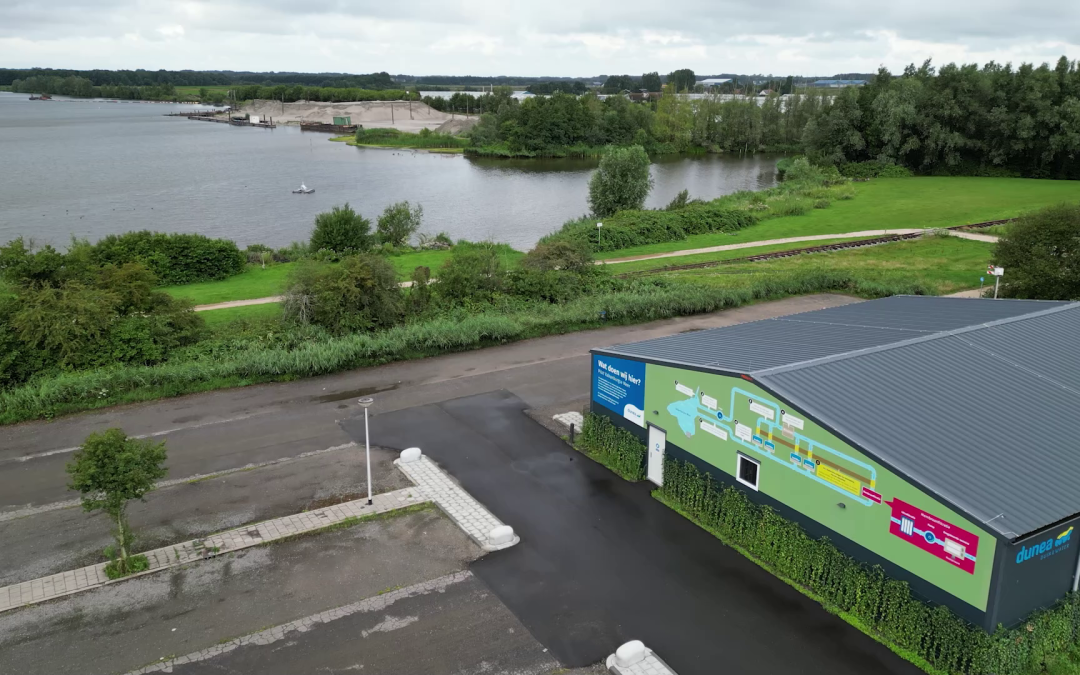
by admin | Nov 2, 2023 | Demosite 1, Demosite 2, Demosite 3, Demosite 4, Demosite 5, Demosite 6, Demosite 7, News
MAR2PROTECT will help save the world’s groundwater from contamination through an innovative and holistic approach. This research project brings together two main strategies, the M-AI-R tool and LivingLabs, to create new approaches for safeguarding groundwater as it becomes more vulnerable in the face of climate change.
The tool M-AI-R will be placed in at-risk aquifers and receive real-time information from sensors, aiming at quantifying global change/climate change impacts on groundwater. At the same time, LivingLabs are being set up in each aquifer region, creating a space for interactions in which stakeholders are at the center of the innovation process.
There are seven demo-sites located across Africa and Europe; South Africa, Tunisia, Netherlands, and Spain are each home to one demo-site, while Portugal is home to two. These sites have been carefully chosen by their success in previous projects as well as the climatic conditions, water sources, types of pollution, Managed Aquifer Recharge schemes and socio-political contexts.
The project kicked off in December of 2022 and will run for four years. It is funded by the Horizon Europe programme with a total cost of €4.143.681,25. MAR2PROTECT will usher in a new generation of Managed Aquifer Recharge (MAR) that engages stakeholders and enhances both groundwater quality and quantity.
Innovation experiments with stakeholders in real-life settings
A tailored methodology is currently being deployed in each demo-site to establish the LivingsLabs. These LivingLabs bring together stakeholders from citizens and civil society organizations to scientists, public sector agencies, and industry leaders. The LivingLabs consist of a series of workshops that allow stakeholders to provide feedback on the effectiveness, suitability and replication potential of the implemented technologies. Using this co-creative approach, stakeholders will also help the project identify the best ways for local societal engagement such as raising community awareness and preventing water contamination, beyond the mere implementation of the project technologies. In this way, MAR2PROTECT will carry out cutting-edge research and trigger changes in a real-life context. The first LivingLab will be launched in the Emilia-Romagna region in Italy on 5 December 2023.
A multidisciplinary consortium
MAR2PROTECT brings together 11 partners from 7 countries to form a diverse and dynamic consortium. coordinated by FCT NOVA. It involves 7 Research and Technology Organisations (CIIMAR, CETAQUA, AQUATEC, IHE, IT, ISSBAT and SUWI), 3 universities (FCT NOVA, UNIBO and KTU), and 1 technology transfer entity (FEUGA). It also includes 3 large water utilities (AdTA, Dunea and HERA), 1 university (FHNW) and a public administration (City of Cape Town) as associated partners.

by admin | Apr 20, 2023 | Demosite 7, News
November 26th, marked the launch of the societal activities co-designed within our Lima Estuary Demosite Living Lab, as part of the MAR2PROTECT project. This exciting initiative was organized by our partner CIIMAR and involved students from Escola Secundária de Santa Maria Maior in Viana do Castelo, one of the participating schools in this Living Lab.
The activity began with an engaging presentation on the importance of saltmarshes in maintaining water quality. The students were introduced to the vital role these ecosystems play in coastal sustainability and environmental health.
As part of this ongoing initiative, next month the students will visit the Lima Estuary revegetation site, which was initiated on October 21st. During the field trip, they will observe the transplanted plots, collect water quality parameters, and gather data for classroom analysis. This hands-on experience will offer valuable insights into the restoration process and the significant impact of saltmarshes on the local environment.
We are excited to continue developing societal activities and look forward to further community-driven environmental education through the Living Lab.
Take a look at the photos taken during the activity!

